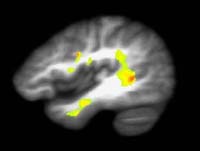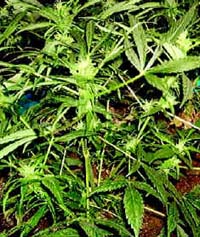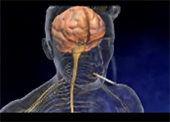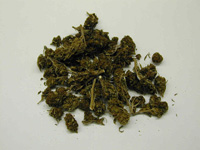Entries Tagged as 'Marijuana Addiction'
 Research appearing in the January 2009 issue of the Journal of Psychiatric Research shows that teenagers who are heavy users of marijuana are more likely than non-users to have disrupted brain development.
Research appearing in the January 2009 issue of the Journal of Psychiatric Research shows that teenagers who are heavy users of marijuana are more likely than non-users to have disrupted brain development.
In the photo, the yellow areas in the brain of a heavy marijuana smoker show brain regions with the most significant abnormalities. These areas correspond with those under development during normal adolescent years. (Credit: The Children’s Hospital of Philadelphia)
Pediatric researchers found abnormalities in areas of the brain that interconnect brain regions involved in memory, attention, decision-making, language and executive functioning skills. The findings are of particular concern because adolescence is a crucial period for brain development and maturation.
[Read more →]
Tags: Marijuana Addiction
A research report states that human male fertility is impacted by chronic marijuana users. Evidence shows that the sperm has decreased ability to fertilize due to poor penetration of the female egg.
[Read more →]
Tags: Marijuana Addiction · News - Addiction and Alternative Health
 A study from Vanderbilt University that appears in the Journal of Clinical Investigation reveals that marijuana use at the time of conception and early in pregnancy prevents embryos’ safe passage from the ovary to the uterus, resulting in early pregnancy failure.
A study from Vanderbilt University that appears in the Journal of Clinical Investigation reveals that marijuana use at the time of conception and early in pregnancy prevents embryos’ safe passage from the ovary to the uterus, resulting in early pregnancy failure.
Marijuana, the most widely used illegal drug among women of reproductive age, binds to 2 receptors — cannabinoid receptors 1 and 2 (CB1, CB2) — which are found in the brain and other organs including sperm, eggs, and newly formed embryos. Normally, these 2 receptors are activated by the naturally occurring signaling molecule anandamide. Anandamide formation by the enzyme NAPE-PLD is carefully balanced with its degradation by the enzyme FAAH, resulting in a finely tuned local “anandamide tone” in embryos and the oviduct. This balance is required for normal embryonic development, transport along the oviduct, implantation in the uterus, and full-term pregnancy.
The results of the study show that drugs such as THC persist and swamp these finely tuned signaling systems and as such the use of THC-containing drugs such as marijuana may lead to ectopic pregnancy and/or impaired fertility in women.
[Read more →]
Tags: Marijuana Addiction
 A pothead is one who habitually smokes marijuana which is often called “pot,” “grass,” “weed,” “reefer,” or “mary jane”.
A pothead is one who habitually smokes marijuana which is often called “pot,” “grass,” “weed,” “reefer,” or “mary jane”.
Marijuana is a greenish-gray mixture of the dried, shredded leaves, stems, seeds, and flowers of Cannabis sativa, the hemp plant.
Most users smoke marijuana in hand-rolled cigarettes called joints, among other names; some use pipes or water pipes called bongs. Marijuana cigars called blunts have also become popular.
Unscientific Research About Marijuana Abuse
Here are comments from a previous distributor of marijuana regarding his observation of his pothead clients over the long term.
Potheads:
* suffer from poor memory
* are lethargic
* have low vitality
* have lower sexual appetite
* have abnormally coated tongues and bad breath
* are more susceptible to infection and colds that last for months
* can not smell or taste as well as nonheads
* have blood-shot eyes
* have pale skin
The above is an unscientific study but revealing anyway.
Scientific Research About Marijuana Abuse
Potheads – Regular Users of Marijuana:
* Heart begins beating more rapidly (within minutes)
* Blood vessels in the eyes expand making the eyes look red
* Experiences intense sensations, colors, and sounds
* Time appears to pass very slowly
* The mouth feels dry
* Hands may tremble and grow cold
* May feel depressed or experience anxiety, fear, distrust, or panic
* Short term and long term memory impaired
* Attention and judgment impaired
* Coordination and balance is impaired
* Lack self confidence
* Lack motivation and pursuit of goals
* Immune system’s ability to fight off infectious diseases is impaired
* Increases risk of chronic cough, bronchitis, and emphysema
* Increases risk of cancer of the head, neck, and lungs
* Students get lower grades and are less likely to graduate from high school
* Workers have more problems on the job such as increased absences, tardiness, accidents and job turnover
[Read more →]
Tags: Marijuana Addiction
 Chronic, heavy marijuana use during adolescence, which is a critical period of ongoing brain development, is associated with poorer performance on thinking tasks, including slower psychomotor speed and poorer complex attention, verbal memory and planning ability.
Chronic, heavy marijuana use during adolescence, which is a critical period of ongoing brain development, is associated with poorer performance on thinking tasks, including slower psychomotor speed and poorer complex attention, verbal memory and planning ability.
Research supported by the National Institute on Drug Abuse (NIDA) shows that it is evident even after a month of stopping marijuana use. There may be partial recovery of verbal memory functioning within the first three weeks of abstinence from marijuana, but complex attention skills continue to be affected.
Not only are their thinking abilities worse, their brain activation to cognitive tasks is abnormal. The tasks are fairly easy, such as remembering the location of objects, and they may be able to complete the tasks, but the adolescent marijuana users are using more of their parietal and frontal cortices to complete the tasks. Their brain is working harder than it should.
Girls may be at an even greater risk than boys.
[Read more →]
Tags: Drugs and Brain Disorders · Marijuana Addiction
 The Office of National Drug Control Policy (ONDCP) and the National Institute on Drug Abuse (NIDA) recently released a report that revealed the levels of THC – the psychoactive ingredient in marijuana – has reached the highest-ever amounts since scientific analysis of the drug began in the late 1970s.
The Office of National Drug Control Policy (ONDCP) and the National Institute on Drug Abuse (NIDA) recently released a report that revealed the levels of THC – the psychoactive ingredient in marijuana – has reached the highest-ever amounts since scientific analysis of the drug began in the late 1970s.
According to the latest data on marijuana samples analyzed to date, the average amount of THC in seized samples has reached a new high of 9.6 percent. This compares to an average of just under 4 percent reported in 1983 and represents more than a doubling in the potency of the drug since that time.
The image shown is referred to as a “steam roller” (peace pipe). The pipe is used by marijuana smokers. The smokers fill the bowl with cannabis, then put the hand over the end of the pipe nearest the bowl and the other end in the mouth. After lighting and inhaling until the chamber is filled with smoke, you then remove the hand and quickly inhale the collected smoke to have a stronger high.
“The increases in marijuana potency are of concern since they increase the likelihood of acute toxicity, including mental impairment,” said Dr. Nora Volkow, Director of the National Institute on Drug Abuse. “Particularly worrisome is the possibility that the more potent THC might be more effective at triggering the changes in the brain that can lead to addiction.
The increased potency of marijuana available in the United States also corresponds with other troubling research showing links between marijuana use and depression. See this article on marijuana and depression.
“Pot” smokers are self medicating to feel better but it is a false feeling as long term brain damage is being done, especially with heavy users.
[Read more →]
Tags: Marijuana Addiction
 Research shows that some teens are “self medicating” by using street drugs like marijuana to try and overcome feelings of depression. What they do not realize is that marijuana can actually compound the problem.
Research shows that some teens are “self medicating” by using street drugs like marijuana to try and overcome feelings of depression. What they do not realize is that marijuana can actually compound the problem.
A recent report from the White House Office of National Drug Control Policy, shows a staggering two million teens felt depressed at some point during the past year, and depressed teens are more than twice as likely as non-depressed teens to have used marijuana during that same period.
Depressed teens are also almost twice as likely to have used illicit drugs as non-depressed teens. They are also more than twice as likely as their peers to abuse or become dependent on marijuana. Marijuana use is associated with depression, suicidal thoughts, and suicide attempts.
“Marijuana is not the answer. Too many young people are making a bad situation worse by using marijuana in a misguided effort to relieve their symptoms of depression,” said John P. Walters, Director, National Drug Control Policy. “Parents must not dismiss teen moodiness as a passing phase. Look closely at your teen’s behavior because it could be a sign of something more serious.”
More teens use marijuana than all other illicit drugs combined. The new report shows the following:
[Read more →]
Tags: Marijuana Addiction
Research by a group of scientists studying the effects of heavy marijuana use shows that withdrawal from the use of marijuana is similar to what is experienced by people when they quit smoking cigarettes.
[Read more →]
Tags: Marijuana Addiction
 Smoking a joint is equivalent to 20 cigarettes in terms of lung cancer risk, and scientists have warned of an “epidemic” of lung cancers linked to cannabis (marijuana).
Smoking a joint is equivalent to 20 cigarettes in terms of lung cancer risk, and scientists have warned of an “epidemic” of lung cancers linked to cannabis (marijuana).
In an article published in the European Respiratory Journal, the scientists said cannabis could be expected to harm the airways more than tobacco as its smoke contained twice the level of carcinogens, such as polyaromatic hydrocarbons, compared with tobacco cigarettes.
The method of smoking also increases the risk, since joints are typically smoked without a proper filter and almost to the very tip, which increases the amount of smoke inhaled. The cannabis smoker inhales more deeply and for longer, facilitating the deposition of carcinogens in the airways.
Marijuana addiction is becoming a real problem.
More information on this research:
[Read more →]
Tags: Marijuana Addiction
Recent research showed that prenatal exposure has significant and long-term effects on the developing Central Nervous System, said Dr. Nancy Day. "We know that prenatal exposure to marijuana leads to deficits in mood, aggression, cognitive development, working memory, and, as secondary results, higher rates of substance use, sexual behavior, and academic problems".
[Read more →]
Tags: Marijuana Addiction
 Research appearing in the January 2009 issue of the Journal of Psychiatric Research shows that teenagers who are heavy users of marijuana are more likely than non-users to have disrupted brain development.
Research appearing in the January 2009 issue of the Journal of Psychiatric Research shows that teenagers who are heavy users of marijuana are more likely than non-users to have disrupted brain development.  A study from Vanderbilt University that appears in the Journal of Clinical Investigation reveals that marijuana use at the time of conception and early in pregnancy prevents embryos’ safe passage from the ovary to the uterus, resulting in early pregnancy failure.
A study from Vanderbilt University that appears in the Journal of Clinical Investigation reveals that marijuana use at the time of conception and early in pregnancy prevents embryos’ safe passage from the ovary to the uterus, resulting in early pregnancy failure.  A pothead is one who habitually smokes marijuana which is often called “pot,” “grass,” “weed,” “reefer,” or “mary jane”.
A pothead is one who habitually smokes marijuana which is often called “pot,” “grass,” “weed,” “reefer,” or “mary jane”.  Chronic, heavy marijuana use during adolescence, which is a critical period of ongoing brain development, is associated with poorer performance on thinking tasks, including slower psychomotor speed and poorer complex attention, verbal memory and planning ability.
Chronic, heavy marijuana use during adolescence, which is a critical period of ongoing brain development, is associated with poorer performance on thinking tasks, including slower psychomotor speed and poorer complex attention, verbal memory and planning ability.  The Office of National Drug Control Policy (ONDCP) and the National Institute on Drug Abuse (NIDA) recently released a report that revealed the levels of THC – the psychoactive ingredient in marijuana – has reached the highest-ever amounts since scientific analysis of the drug began in the late 1970s.
The Office of National Drug Control Policy (ONDCP) and the National Institute on Drug Abuse (NIDA) recently released a report that revealed the levels of THC – the psychoactive ingredient in marijuana – has reached the highest-ever amounts since scientific analysis of the drug began in the late 1970s.  Research shows that some teens are “self medicating” by using street drugs like marijuana to try and overcome feelings of depression. What they do not realize is that marijuana can actually compound the problem.
Research shows that some teens are “self medicating” by using street drugs like marijuana to try and overcome feelings of depression. What they do not realize is that marijuana can actually compound the problem.  Smoking a joint is equivalent to 20 cigarettes in terms of lung cancer risk, and scientists have warned of an “epidemic” of lung cancers linked to cannabis (marijuana).
Smoking a joint is equivalent to 20 cigarettes in terms of lung cancer risk, and scientists have warned of an “epidemic” of lung cancers linked to cannabis (marijuana).